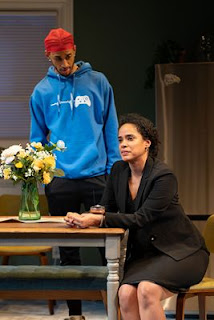Diversity is sometimes thought of as the vegetable of theatrical offerings: something that we theater lovers should include in the diet of things we consume because it’s "good" for us. But maybe we should be thinking of it as the spice that can bring some zest to the theatrical mix. At least that’s what I’ve been thinking after seeing three recent shows that have found new flavors in familiar tropes by unabashedly rooting themselves in the customs and language of cultures whose stories we’re only now beginning to see onstage.
Monsoon Wedding. This musical adaptation of Mira Nair’s 2001 film that is now playing at St. Ann’s Warehouse through June 25 puts Indian culture in the spotlight. Its book by Arpita Mukherjee and Sabrina Dhawan sticks close to Nair’s original story about the complications surrounding an arranged marriage between a wealthy New Delhi girl and the American-reared son of an Indian family who live in the U.S. Maybe too close (click here to read more about the adaptation).
It might have worked better if Mukherjee and Dhawan had gotten rid of some of the film’s ancillary relatives and their storylines and instead, focused on the main couple, who are here charmingly played by Salena Qureshi and Deven Kolluri. And the score, with music by Vishal Bhardwaj and lyrics by Masi Asare and Susan Birkenhead, is only so-so, a motley mix of show tunes and Bollywood-style bangers that, with the exception of a ballad or two, drift in one ear and out the other.
But Nair, who conceived and directed the show, understands that at its heart Monsoon Wedding is a riff on a Shakespearean comedy, complete with high and low humor and multiple marriages at its end. She makes it her own by leaning into the details that make up modern Indian life, be it the lingering respect for familial ties, the colloquial Hindi that's sprinkled throughout the script or the splashy production numbers reminiscent of those in Bollywood films.
In the end, it’s fun to see a cast of some two dozen Indian actors filling the stage and having such a good time doing so. And it was just as gratifying to see so many South Asian people in the audience with big smiles on their faces.
Bernarda’s Daughters. Five Haitian-American sisters in contemporary Flatbush anchor Diane Exavier’s retelling of Spanish playwright Federico Garcia-Lorca’s classic drama The House of Bernarda Alba that is being given a joint production by National Black Theatre and The New Group at the Signature Center through June 4.
Exavier peppers her version of this story of frustrated women held back by societal restraints with bits of French and Creole and with references to Brooklyn landmarks and lore. All of it clearly hit home with many members of the audience the night I saw the show. But I have to confess that it didn’t work as well for me.
The show’s set is basically empty, save for some boxes and floor pillows, and so oddly constructed that at times important scenes can only be seen by some portions of the audience. Dominique Rider’s direction was just as poorly focused and the actors came across as though they were performing in different plays, although Pascale Armand and Tamara Tunie do manage to bring some gravitas to the roles of the eldest sister and the girls’ grandmother.
But again, the people sitting around me seemed to delight in the show’s insider jokes, its politics (anti-gentrification) and just in the fact that so many black women were sharing a stage together. It wasn’t just the larger than usual number of black people in the audience enjoying it either. The young white guy sitting in front of me was one of the first to jump up at the end to show his appreciation with a standing ovation.
Bees & Honey. It’s usually a put-down when you say that a show resembles a romcom but Guadalís Del Carmen’s two-hander about the relationship between a Dominican couple in Washington Heights playing at MCC through June 11 is an endearing delight.
That’s partly because guided by Melissa Crespo’s deft direction, there’s such terrific chemistry between the actors Maribel Martinez and Xavier Pacheco. But the show also works because, Del Carmen has her couple Jahaira and Manuel sidestep the usual stereotypes by making them specific and relatable people.
There's no gangbanging. Or immigration angst. Jahaira is a lawyer rising through the ranks at the D.A.’s office; Manuel owns an auto-repair shop and is successful enough that he’s planning to expand to other boroughs. She reads bell hooks; he relaxes with videogames. They both love eating sancocho and dancing bachata. Each lapses into Spanish when feeling agitated or amorous.
This time, the larger than usual number of audience members at my performance were Latino and they clearly identified with the characters, laughing heartily at jokes the rest of us knew to be funny, even if we weren’t entirely sure why.
But none of these shows made me feel shut out, even when the characters spoke a few words in languages I don’t know. Rather, I felt as though I were being given a chance to share in an experience I hadn’t seen onstage before.
These aren’t perfect shows. I particularly disliked the serious issues—child sexual abuse in Monsoon Wedding, police shootings of young black men in Bernarda’s Daughters, the legal system’s inadequate response to rape victims in Bees & Honey—that seemed shoehorned into each show, perhaps in misguided attempts to make them relevant to wider audiences.
We don’t need that kind of pandering. We just need more chances like these to see new stories, or even old ones, reflected through a refreshingly new gaze.





